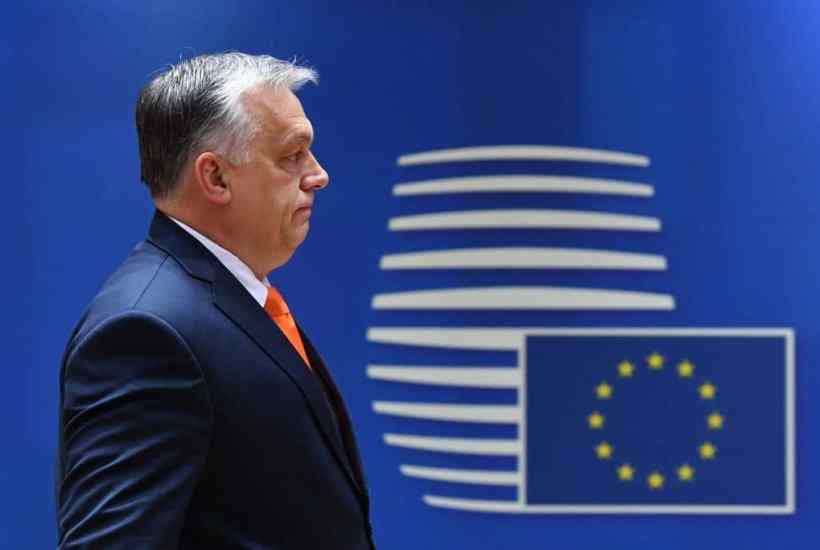The scale of Viktor Orbán’s victory in the Hungarian election overnight has taken even his supporters by surprise. Against many predictions, Orbán has actually improved his position: he has retained for his Fidesz party the two-thirds parliamentary majority necessary to override certain constitutional challenges to change a number of constitutional rules. Progressive opinion, in and out of Brussels, is not difficult to gauge. This is an unfair victory in a gerrymandered electoral system by someone who used an inflated media influence to trounce his opponent Péter Márki-Zay, who called for close EU co-operation and an increase in anti-Putin zeal. It shows Hungary as unconcerned with the rule of law. As a result it isolates Hungary, alienating it not only from the EU but from the other Visegrad states (Poland, Czechia and Slovakia), who want tougher moves against Putin; only last week, it is worth remembering, those states pulled out of a projected Visegrad meeting in Budapest over precisely that issue.
All these charges are at least partly true. Hungary is not very liberal, and is certainly not a model democracy. In addition Orbán is undoubtedly too close for comfort to some very unpleasant dictators: not only to Putin, who gives him a very good deal on energy in order to keep him onside and the lights on in Budapest, but also to Xi Jinping. (Hungary, remember, has been an enthusiastic Belt and Road partner for some seven years, with increasing signs of a numinous, and ominous, Chinese presence.) Nevertheless, if Brussels has any sense it will see this result not so much as a reason to wag fingers at Budapest as a warning to itself.
First, it seems fairly clear that it was a genuine popular victory, even discounting the built-in advantages for Orbán. The opposition was admittedly united; but since it comprised a curious combination of socialists, greens and fairly far-right parties such as Jobbik (once reputedly even more extreme than Fidesz), its only serious offering was that it wasn’t Fidesz. Many Hungarians, one suspects, spotted that even if they elected it, a pantomime horse like this wouldn’t be very good at agreeing much coherent action. Orbán shrewdly calculated that his policies of fiscal largesse and a promise to keep Hungary on the sidelines of the Ukrainian war would cut more ice with voters than the spoutings of a congeries of idealists.
Secondly, Orbán’s victory will have dashed a pious hope in Brussels: that the tiresome eastern European distaste for the kind of interference in nations’ social and internal affairs that is normal in the old EU was a passing phase.
On this view, populist leaders like Mateusz Morawiecki in Poland and Orbán in Hungary would be swept away like chaff once electors came to their senses and realised the advantages of playing things the EU way. Any such view now looks comprehensively debunked. Even against a background of EU partisanship and ill-disguised threats to cease bankrolling states not toeing the Brussels line, the Hungarians voted for policies they approved of even if Brussels didn’t. In a further blow to Europe’s pretensions to a position on the moral and social high ground, they also voted roughly 90 per cent in favour of a referendum to limit promotion of LGBT content to the young; this plebiscite was only lost because a ballot-spoiling initiative prevented it reaching a quorum of one-half of the votes cast.
No doubt the European Commission, which detests the ruling PiS Party in Poland almost as much as Fidesz in Hungary, still harbours faint hopes for the opposition in Poland’s next election. But if yesterday’s poll is anything to go by, they may well be whistling to keep their spirits up.
Third, Brussels’s legal onslaught against eastern Europe on rule of law grounds seems increasingly fated to run into the sand. There have been plans for some time to sanction recalcitrant states under Article 7, with Poland and Hungary specifically threatened. But this requires unanimity of all the other states. Hungary and Poland have had an informal agreement whereby each will stymie any such move against the other; any hopes the EU Commission may have had for an end to this pact now lie shattered.
It is also true that Brussels still has its newly-acquired power to withdraw EU funds from a state on the basis that its failure to observe the rule of law threatens the integrity of the EU budget, or to fine it for what the Court of Justice determines is a persistent breach of EU law. But since the EU continues to need the goodwill of states such as Poland and Hungary in the refugee crisis caused by the Ukrainian situation, withdrawing funds or fining either state remains politically fraught and likely to cause more dissension than obedience.
What does all this say for Europe’s position in relation to Ukraine? Oddly enough, probably not very much. True, Volodymyr Zelensky has called out Orbán for half-heartedness; and Orbán for his part made a barbed reference yesterday to his opponents having included ‘the left at home, the international left, the bureaucrats in Brussels, the money of the Soros empire, the international media and even the Ukrainian president’. But Hungary, which as well as its liking for Russian energy has its own dispute with Ukraine over its treatment of the Hungarian minority there, has always been an outlier.
In any case, the EU itself has hardly been at the head of the fight against Putin, with Germany and other western members unwilling to agree sanctions that seriously prejudice their own interests. In what is increasingly becoming a Europe of nations, whether Brussels likes it or not, the position of the EU on this part of the international stage is fast becoming an irrelevance. Putin, unfortunately, can well afford to take the view that he might as well close his EU file on the basis that he has other, bigger, fish to fry.
Got something to add? Join the discussion and comment below.
Get 10 issues for just $10
Subscribe to The Spectator Australia today for the next 10 magazine issues, plus full online access, for just $10.



















Comments
Don't miss out
Join the conversation with other Spectator Australia readers. Subscribe to leave a comment.
SUBSCRIBEAlready a subscriber? Log in